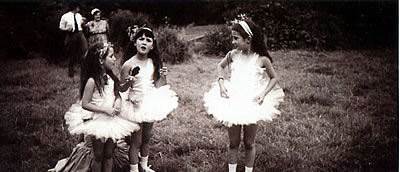TG: Born
in Great Britain, your first dream was to become a dancer.
What was the impetus?
JS: My
mother tells me that from the time I was first able to
walk, I was dancing in the kitchen, knocking everything
over. When I attended my first school, primary school,
I was singled out from all the other children because
I had flat feet and a speech impediment. I was told that
I had to do remedial work, that I had to come to school
earlier to do flat feet exercises, which consisted of
walking on the outside of your feet. My parents were
told that dancing would be good for me so they enrolled
me in a dance class. That was it. I immediately fell
in love with ballet and decided that I wanted to become
a prima ballerina. From the earliest time I can remember,
from the age of five or six, that was all I wanted to
be. I was completely focused. Other children were into
dolls and sports; I was totally into dancing. It came
to me naturally. I just loved to dance.
I began entering competitions but my parents were very much against my becoming
a professional dancer. That is not the life they envisioned for me. I was sent
to a regular girls' school and I had a terrible time. I was constantly teased
because of my love of ballet. The students were all very academic and very sporty
and I was not - I was more into the arts. I lived for the moment I could go to
my ballet classes. Eventually my parents were told that l had potential, and
I was sent to try out for the Royal Ballet. I didn't get in.
My father was a doctor and that same year he answered an ad in a medical journal
from a professor of obstetrics and gynecology in Seged, in Communist Hungary.
He had three daughters, like my father did and wanted to send his girls to England
so they could learn English. This was during the time of the Iron Curtain, when
nobody went to Hungary.
My father decided I could
go, so I went by myself to Hungary at the age of 12. I was
pretty terrified. I found myself unable to communicate, eating
raw bacon fat, and living off the candy that I had brought
with me. I learned to speak a little Hungarian and learned
the names of foods that I liked. While I was there, the head
of the Hungarian State Ballet saw me on the beach, asked
who I was, and immediately offered me a place in the ballet
school. My parents were totally against this, but they reluctantly
allowed me to come home and audition for another ballet school
in England, a school that was more of a theatre arts school,
offering more than just classical ballet.
I was taught modern
dance, choreography, singing - so many things. The school
was called the
Arts Educational Trust. I studied
everything from fashion design to fine art, to the history
of theatre and ballet. I sang, learned opera, played instruments,
studied musical comedy and learned how to tap dance. . I
learned national folk dance and ballroom dancing. You name
it, I did it! Because of that amazing background, I can pretty
much play any role I want to play.

I was injured in a dance class when I was about 15, having
danced with the
London Festival Ballet and the
Kirov
Ballet from Russia, as a member of the,
Quarter
Ballet. My knees were so badly injured that I segued
into the theatre program. Because of the injury, I realized
that I was not going to make it as a prima ballerina. The
headmistress took me aside and told me to do more theatre
and ballet.
Fortunately, at that same time I met
Franco Zeffirelli, just the day
before Romeo and Juliet came out. He was going to do another movie entitled
Roman
Holiday, and I met him to discuss playing the lead in that movie. Of course
they never made the film, but I was screen tested by
Franco Zeffirelli and
that was my first experience in film.